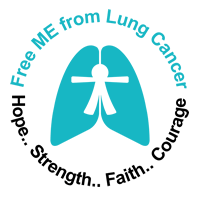 A clinical trial is a way to improve the current treatment options or to find a new and better treatment option to benefit patients. Clinical trials, or studies, are available for people diagnosed with all stages of lung cancer. Clinical trials help the scientist find the safest and most effective treatments. Clinical trials help find new treatments and advancements in the treatment of lung cancer. Participants in clinical trials can play a more active role in their own health care, gain access to new research treatments before they are widely available, and help others by contributing to medical research.
A clinical trial is a way to improve the current treatment options or to find a new and better treatment option to benefit patients. Clinical trials, or studies, are available for people diagnosed with all stages of lung cancer. Clinical trials help the scientist find the safest and most effective treatments. Clinical trials help find new treatments and advancements in the treatment of lung cancer. Participants in clinical trials can play a more active role in their own health care, gain access to new research treatments before they are widely available, and help others by contributing to medical research.
Clinical trials must follow a protocol. This means that all of the steps of the study are clear and are followed in the same way. All participants must meet the eligibility criteria. This ensures that nothing will interfere with getting reliable information from the study.
New chemotherapy drugs, vitamins, surgical and radiation techniques, vaccines, and biological therapies are a few of the treatments currently being studied in clinical trials. These studies may involve adding a new treatment in combination with existing drugs that have already been approved for the treatment of lung cancer. Joining a clinical trial is free. Most hospitals, as well as other agencies, offer clinical trials. Before you join a clinical trial, talk with your doctor about what is available and right for you. Some questions you might want to ask are:
The Study
What is the purpose of the study?
Why do researchers think the approach may be effective?
Who will sponsor the study?
Who has reviewed and approved the study?
How are the study results and safety of participants being checked?
How long will the study last?
What will my responsibilities be if I participate?
Possible Risks and Benefits
What are my possible short-term benefits?
What are my possible long-term benefits?
What are my short-term risks, such as side effects?
What are my possible long-term risks?
What other options do people with my risk of cancer or type of cancer have?
How do the possible risks and benefits of this trial compare with those options?
Participation and Care
What kinds of therapies, procedures and /or tests will I have during the trial?
Will they hurt, and if so, for how long?
How do the tests in the study compare with those I would have outside of the trial?
Will I be able to take my regular medications while in the clinical trial?
Where will I have my medical care?
Who will be in charge of my care?
Personal Issues
How could being in this study affect my daily life?
Can I talk to other people in the study?
Cost Issues
Will I have to pay for any part of the trial such as tests or the study drug?
If so, what will the charges likely be?
What is my health insurance likely to cover?
Who can help answer any questions from my insurance company or health plan?
Will there be any travel or child care costs that I need to consider while I am in the trial?
Tips for asking your doctor about trials.
Consider taking a family member or friend along, for support and for help in asking questions or recording answers.
Plan ahead what to ask–but don’t hesitate to ask any new questions you think of while you’re there.
Write down your questions in advance, to make sure you remember to ask them all.
Write down the answers, so that you can review them whenever you want.
Consider bringing a tape recorder to make a taped record of what’s said (even if you write down answers).
Clinical trials are conducted in phases. The trials at each phase have a different purpose and help scientists answer different questions:
In Phase I trials, researchers test an experimental drug or treatment in a small group of people (20-80) for the first time to evaluate its safety, determine a safe dosage range, and identify side effects.
In Phase II trials, the experimental study drug or treatment is given to a larger group of people (100-300) to see if it is effective and to further evaluate its safety.
After a product has successfully completed phase I and II trials, researchers file a new Drug Application (NDA) with the FDA to ask for permission to begin a phase III trial. This means that the treatment has been found to be safe and appears to have benefits.
In Phase III trials, the experimental study drug or treatment is given to large groups of people (1,000-3,000) to confirm its effectiveness, monitor side effects, compare it to commonly used treatments, and collect information that will allow the experimental drug or treatment to be used safely.
In Phase IV trials, post marketing studies delineate additional information including the drug’s risks, benefits, and optimal use.
Once the trial phases have been completed, the results are sent to the FDA to start the approval process. Once the treatment has been approved by the FDA it may be used by the physician.
Everyone that enters a clinical trial must sign an informed consent form. Informed consent is the process of learning the key facts about a clinical trial before deciding whether or not to participate. It is also a continuing process throughout the study to provide information for participants. To help someone decide whether or not to participate, the doctors and nurses involved in the trial explain the details of the study.
Resources for Clinical Trials:
Clinical Trials – Dana Farber
Find a Doctor – Dana Farber
Clinical Trials – Massachusetts General
Find a Doctor – Massachusetts General
Maine Center for Cancer Medicine
Find a Doctor – Mercy Hospital
Maine Medical Center
Maine Health Cancer Resources Center Clinical Trails
Clinical Trials Dartmouth-Hitchcock – Norris Cotton Cancer Center
Clinical Trials Concord Hospital
Clinical Trials National Cancer Institute
The National Lung Screening Trial (NLST) is a clinical trial to assess whether screening individuals at high risk for lung cancer with spiral computerized tomography (CT) or standard chest x-ray can reduce lung cancer deaths. On November 4, 2010, the NLST reported initial trial results, showing 20 percent fewer lung cancer deaths among trial participants screened with low-dose helical CT (also known as spiral CT) compared to those who got screened with chest X-rays.
References:
National Cancer Institute, National Institute of Health Publication No. 07-1553 revised May 2007.
National Institute of Health Understanding Clinical Trials.
For more information on clinical trials go to www.clinicaltrials.gov
